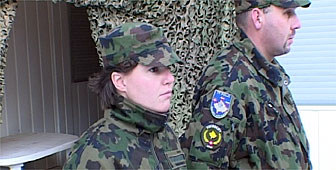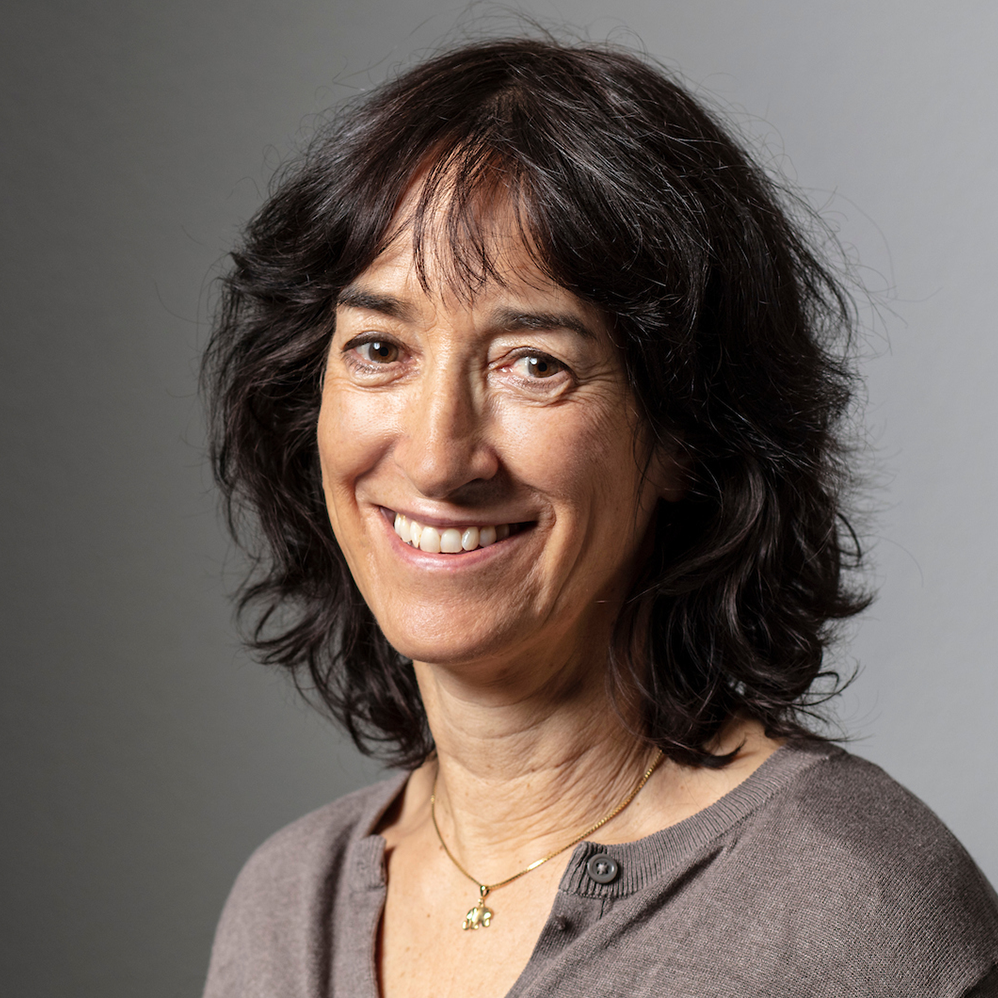Swiss women on the frontlines

Swiss women volunteers are working alongside soldiers from the Swiss army to help rebuild the war-torn province of Kosovo.
Two volunteers, who are working as a nurse and a driver, have spent the past few months looking after foreign troops. Marlene Suter keeps them in good health, while Lisa Zulauf makes sure they are well stocked with much needed supplies.
Marlene Suter from Lucerne is halfway through her six-month stint as a nurse in the Swisscoy infirmary. In Switzerland she is a paediatric nurse. “It’s the first time I’ve ever had to put on military clothes and this whole army thing is very new for me,” she says. “But I like my work here.”
Marlene decided to volunteer for Swisscoy because she wanted to see what life was like in Kosovo after reading about in the newspapers. She works with two Swiss and three Austrian doctors – all of them male.
She works alongside three Swiss nurses – all female – and 14 Austrian nurses, who are all men. They assist two Swiss and three Austrian doctors – also men.
Opposite sex
Marlene is pleased that her Swiss nursing colleagues are women because, she says, she might otherwise feel a little overwhelmed by being completely surrounded by the opposite sex. “You learn a lot about yourself and men,” she remarks.
“Sometimes you can play a little with the men. But you can say ‘stop’. As soon as you set the limits, they are OK after this.
“We are very important for the contingent. As a nurse, I have the best role. I am good at my job and the men appreciate that. They also come and confide in me if they have a problem.”
The most common health problem at camp Casablanca is stomach ailments. Patients stay in the ward for three days, on a diet of dried bread and tea. With the cold weather, patients also come to the clinic with sinus and chest problems. There are three or four patients in the ward every week.
Life-threatening
The more serious cases are sent to the field hospital in the German camp at Prizren, about 30 minutes away by truck. The hospital has an operating theatre and an x-ray machine. Patients with potentially life-threatening ailments can be evacuated by helicopter to a Swiss hospital.
Marlene and her colleagues also operate a Medevac ambulance service. If Kfor soldiers from multinational brigade south are involved in an accident, the Medevac team drives to the scene and offers on the spot treatment.
The team has been called out five times in the past month to treat patients for broken arms, whiplash and back problems resulting from car crashes. Marlene says the worst injury she has had to treat was a serious head wound incurred by a soldier at the camp, when a heavy object fell on him. He was stitched up and is now in good health.
When there are no patients and no Medevac calls, Marlene says things can get rather boring, “but at least it’s a sign that the soldiers are in good health”.
The experience has taught Marlene a lot – not about nursing, but “about friendship and understanding people. I also learnt about myself, my own limitations.”
Transport platoon
Lisa Zulauf from Obfelden near Zurich used to be an officer with the Airport Police. She resigned in September so that she could join the transport platoon of Swisscoy. She has been driving large trucks around Kosovo since September last year, and has three more months to serve on the mission.
On a crisp winter morning, Lisa is preparing to collect ten thousand litres of drinking water from a tank at the German camp in Prizren, 30 minutes drive away.
She will drive this to the German soldiers manning the Marina border post between Kosovo and Albania. It’s a regular trip and Lisa is well equipped for the job. She has a licence to drive heavy goods vehicles, and had to pass an additional military test before she was given the position.
She is accompanied by Matthias Eggenberger from Bern – an engineer in the H2O platoon, who carries a rifle in case they are attacked.
Refugees fled
The Marina border station has a grim history. Between September 1998 and June 1999, an estimated 300,000 refugees fled through the post into Albania to escape their Serb persecutors.
Because of the nature of her job, Lisa has plenty of opportunity to talk to Albanians about the war. They tell her about the systematic campaign of murder, persecution and mass deportation of Kosovo’s ethnic Albanians by the Yugoslav military and police forces.
In a society steeped in tradition, many of the Albanian men are surprised to see a woman driving a large army vehicle. “They stare at me,” she says. “Some wave”.
Lisa enjoys the mountainous landscape through which she has to drive. The roads are often pitted, showing the scars of war.
Assault course
In winter, they are like ice rinks as there are no snow ploughs or machines to lay grit and salt. It’s a little like an assault course – Kosovars are not renowned for sticking to the rules of the road. “You get used to their driving style. You learn what to look out for,” Lisa says.
The area is littered with landmines left behind by the Serbs in 1999, when they pulled out of the province. Most of the mines are not marked on any maps, but Lisa says that as long as she sticks “to the road, there’s no problem.”
At night, Lisa retreats to the quarter where the female soldiers have their containers, and writes songs about her work and life in the camp.
She’s not fazed by being one of the few women in Swisscoy: “I like it. I don’t feel any different here than at home, because there were very few women colleagues in my last job. I’m used to working with men.”
As far as she’s concerned, she’s just “one of the lads”.
by Julie Hunt

In compliance with the JTI standards
More: SWI swissinfo.ch certified by the Journalism Trust Initiative

You can find an overview of ongoing debates with our journalists here. Please join us!
If you want to start a conversation about a topic raised in this article or want to report factual errors, email us at english@swissinfo.ch.